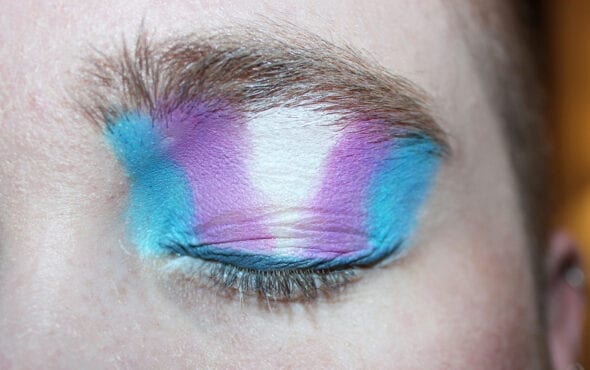
Anastasiia Yeva Domani is the director of Cohort, an expert on the Working Group of Trans People on HIV and Health in Eastern Europe and Central Asia and a representative of the transgender community on the Ukrainian National Council on HIV/AIDS and Tuberculosis.
I have lived in my flat for the past 12 years. But last year, when the war started, I turned my apartment into something resembling a humanitarian office for trans people, so they can come up to see me on the 17th floor of my building and take what they want and what they need.
Primarily, people come to me for their hormone therapy – and also for some food as well as other medicines and anything else that they want and need.
Sometimes, my flat is like a clinic. Because I am giving out certain medications, including sex hormones, I always ask the trans people who come to me for a prescription and check how old they are.
If they are 18 and over, it’s fine. But if they are a child under the age of 18, then no; it’s impossible to get hormone drugs here. It’s one of my very strict rules and the rules also of our local organisations. We don’t want any issue with the authorities or with their parents; young people’s health is very important to us.
The number of people arriving varies according to the time of year. During the summer of last year, in the first few months of the war, there were regularly about 25-30 people who would come round.
I also receive requests on Facebook Messenger, Instagram and Telegram, for people looking for hormones or food – and luckily, I am able to tell them, “No problem, I’ll be able to post this out to you for free.”
I ask for their details – name, phone number and check their prescriptions – and then I go off to the post office and send them.
But it’s better for them to come to my apartment as I can give them more advice and we can sit and talk.
Sometimes, people prefer this anyway as they want to come to my flat and just talk about other topics, whether it’s my advocacy work and help that they might need or details about the next army mobilisation event here in Kyiv.
We usually go through a wide range of topics and I’m expecting quite a few more people to start coming at the beginning of March as it gets warmer. And that will be good, as sometimes it’s difficult for me to take heavy food parcels to the post office and I much prefer it when they can come round and choose they want and need.
In my flat, I also have clothes, candles and lights – which are good for any blackouts people might experience.
The Russian invasion has made buying hormone drugs much more difficult – although the situation is getting better now. It was very difficult to find the drugs in pharmacies 12 months ago, even in Kyiv.
Now, they’re much more expensive – maybe costing two or three times more than before the war.
There are several other NGOs here in the capital and other big cities across Ukraine that are helping trans people like myself with their hormone drugs.
All the trans people have to do is present the prescription from the endocrinologist and then every month they should be able to receive their medication. Here at Cohort, the NGO I run, we are also being helped enormously by our international partners to keep the supply coming.
Even on the frontline in the Donetsk region, we can still send trans people their hormones.
War has made life for trans people in Ukraine much more difficult, but through the support of our friends around the world and an incredible network of people here in the country, we are still ensuring that our trans community is looked after and supported.
As told to Openly editor, Hugo Greenhalgh, in Kyiv, Ukraine, on 21 February, 2021.
GAY TIMES and Openly/Thomson Reuters Foundation are working together to deliver leading LGBTQ+ news to a global audience.



